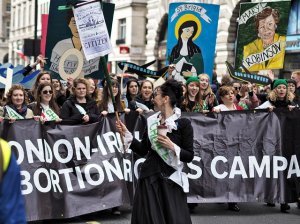We've defended reproductive rights from religiously motivated restrictions since our founding.
Religion should not stand in the way of reproductive healthcare.
A desire to restrict reproductive rights, and to control women's bodies, is a hallmark of religious fundamentalism. We strongly support the right of women to have legal and safe abortions and access to emergency contraception.
Since its founding the National Secular Society has supported reproductive rights. In 1878 our founder and vice-president were prosecuted for making information about birth control accessible to working class women.
Throughout the world, reproductive rights are still under threat from theocrats. While individual religious people hold diverse views on abortion, every stage of progress in reproductive healthcare has been fought by religious organisations. Often these have involved virulent campaigns of intimidation and misinformation.
84% of people in the UK believe abortion should be legal in all or most cases. This includes 76% of religious people and 94% of nonreligious people.
In the UK, emergency contraception can still sometimes be difficult to obtain. Some religious pharmacists have defied General Pharmaceutical Council guidance by refusing to sell it or even to dispense a prescription given to a woman after a consultation with her own doctor.
People of all religions and beliefs can have disagreements on the boundaries of bodily autonomy and reproductive rights. However, religious beliefs should not be used to restrict the bodily autonomy of other people.
Take action!
1. Share your story
Tell us why you support this campaign, and how you are personally affected by the issue. You can also let us know if you would like assistance with a particular issue.
2. Join the National Secular Society
Become a member of the National Secular Society today! Together, we can separate religion and state for greater freedom and fairness.
Latest updates
NSS: religion shouldn’t restrict access to abortion in NI
Posted: Thu, 12 Dec 2019 16:33
The National Secular Society has urged the UK government not to allow religion to limit women's access to abortions in Northern Ireland in response to a consultation.
The government is consulting on a legal framework for abortion services in NI in the wake of an act of parliament which legalised abortion there in October.
In response the NSS argued that institutions with religious objections to abortion "must not be allowed to dominate" debates about it.
"Their beliefs must not be prioritised over women's rights to bodily autonomy, to appropriate medical care and to make their own decisions about their family lives."
The society said attempts to control women's bodies and restrict access to sexual and reproductive health "have been a consistent feature of religious dogma and of societies where religious values are politically privileged".
In response to specific proposals, the NSS said:
- Women and girls should have unrestricted access to abortions up until 24 weeks' pregnancy, as there was "no medical reason for a distinction at any time until viability". This was in response to a question over whether the gestational limit should be up to 12 weeks or 14.
- Abortion should be available without time limit when a foetus has a high probability of dying in utero or shortly after birth. That should also apply where a foetus has a severe impairment likely to limit either the length or quality of the child's life significantly.
- There should be no requirement to certify an abortion, as this would risk enabling healthcare professionals who strongly oppose abortions to obstruct women's ability to have them.
- There should be powers to introduce buffer zones around abortion facilities when anti-abortion protests impede women's right to access medical care and the zones are a proportionate means of protecting it.
- Current British law achieved a reasonable balance between the rights of patients to access safe and legal healthcare and the rights of healthcare professionals to avoid providing abortions. This should be replicated in Northern Ireland.
Explaining the NSS's position, spokesperson Megan Manson said: "Religious groups' ability to restrict women's bodily autonomy is weakening in Northern Ireland, and that's a welcome trend.
"The government must now ensure it doesn't water down its proposals for fear of aggravating them."
Recent background
- Until October, abortion was only allowed in Northern Ireland if a woman's life was at risk or there was a risk of permanent and serious damage to her mental or physical health.
- Last year a UN committee told the government it should ensure women in Northern Ireland could legally terminate their pregnancies. The new consultation document considers how to ensure consistency with the committee's recommendations.
NSS lobbying at UN human rights council
- The NSS submitted evidence to a UN human rights council consultation in 2016 as the council reviewed the UK's record on human rights. The society said Northern Ireland's restrictions on abortion were out of touch with international human rights norms.
Consultation timetable
The consultation timetable is due to enable a new legal framework to be introduced by 31 March 2020.
The consultation is open until 11:45pm on Monday 16 December.
Image by Free-Photos from Pixabay.
NSS welcomes legalisation of abortion & marriage equality in NI
Posted: Tue, 22 Oct 2019 14:53
The National Secular Society has welcomed the legalisation of abortion in Northern Ireland and the extension of same-sex marriage rights to the province.
Legislation making the changes, which was passed by MPs at Westminster in July, came into force on Tuesday morning.
Under NI's previous laws abortion was only allowed if a woman's life was at risk or there was a risk of permanent and serious damage to her mental or physical health. Just 13 women had terminations in NHS hospitals in NI in 2016-17.
NI was also the only part of the UK where same-sex marriage was not recognised.
Religion was a key reason for the draconian laws. Influential Protestant and Catholic politicians and groups staunchly opposed liberalisation in parliament and in court, despite significant public support for change.
The NSS has repeatedly called for reform of the laws in NI and raised the issue of abortion rights in a submission to the UN Human Rights Council (UNHRC) in 2016.
NSS chief executive Stephen Evans said the changes were "welcome and overdue".
"Human rights and personal autonomy should never be restricted by state adherence to religious dogma.
"Under Northern Ireland's previous laws women were unable to access reproductive healthcare or control their bodies, while same-sex couples were subject to an unjustifiable legal indignity that infringed their ability to marry.
"The fact this will now change is a reminder of the importance of standing up to politicians with theocratic agendas."
Previous NSS lobbying at the UN
- The NSS submitted evidence to the UNHRC in 2016 as the council reviewed the UK's record on human rights. The society said Northern Ireland's restrictions on abortion were out of touch with international human rights norms.
Other notes
- The legislation would not have come into effect if the Northern Ireland assembly had blocked it by Monday evening. Politicians from the Democratic Unionist Party triggered the recall of the assembly in an attempt to block the change on abortion, but lacked the cross-party support necessary to do any business.
- The changes to the abortion laws will mean women and girls can terminate pregnancies without fear of being prosecuted, and healthcare workers cannot now be prosecuted for carrying out abortions.
- Earlier this month the high court ruled that NI's abortion laws breached the UK's human rights commitments. The supreme court ruled that the laws were incompatible with human rights legislation last year.
- A UN committee recommended that the UK government should decriminalise abortion and ensure women in Northern Ireland could legally terminate their pregnancies last year.
Image: London-Irish abortion rights rally, © Dmitry Dzhus, via Flickr [CC BY 2.0]




